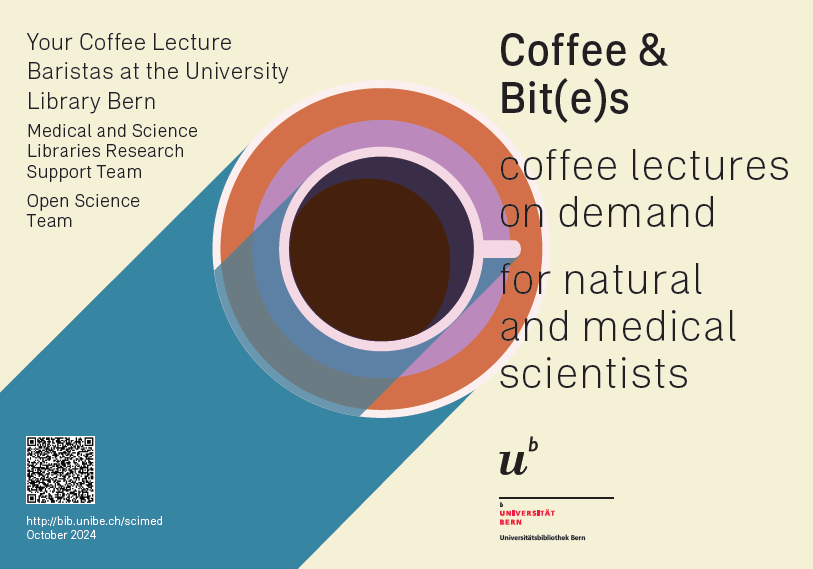Medicine and Pharmacy Portal
The Medicine and Pharmacy Portal offers support for your studies, research and teaching. Here you may find news and information about subject-specific events and services offered by the university library as well as useful tools for your scientific work. Quick links:
Scientific Writing Courses Spring 2026
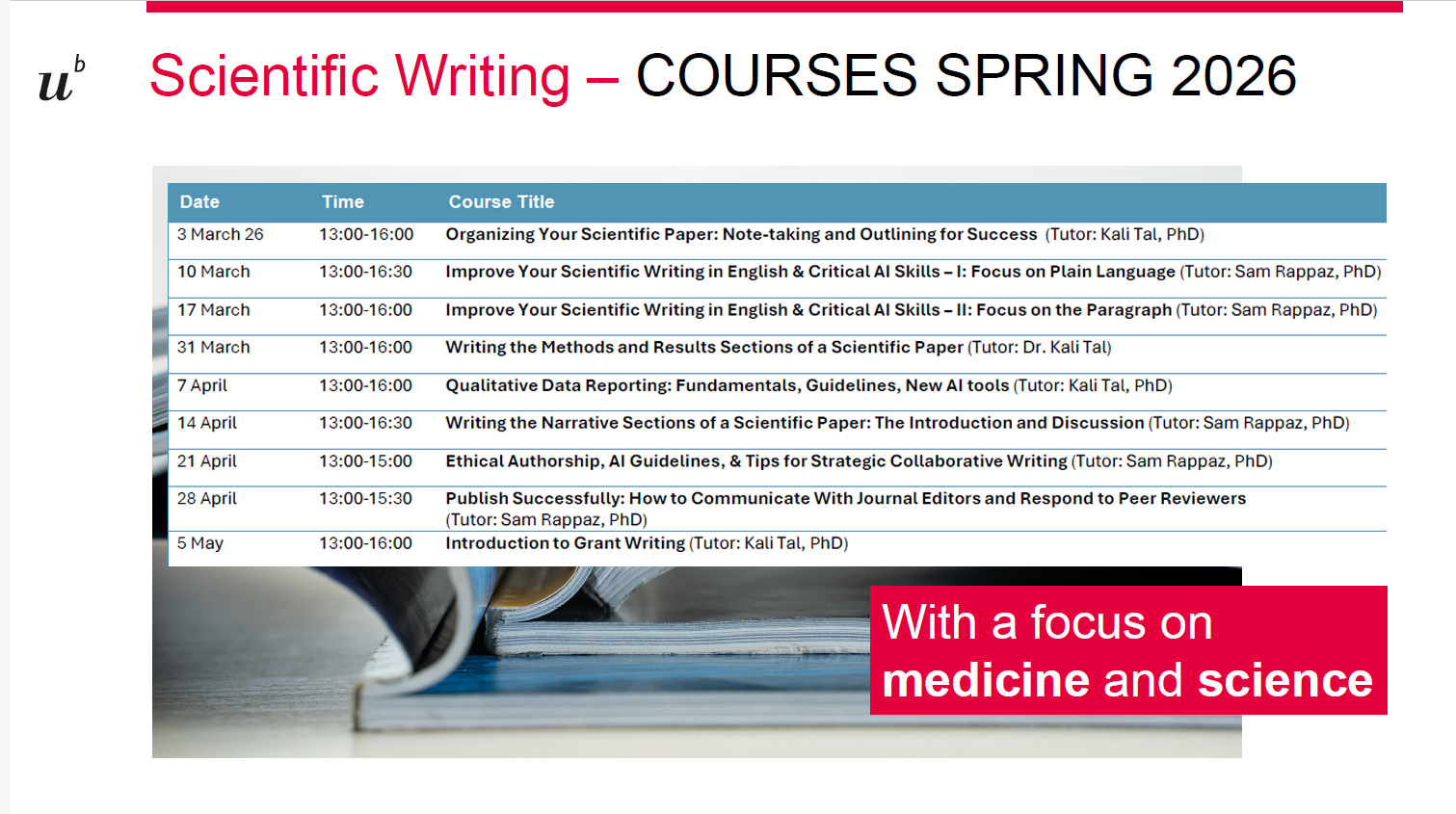
With a focus on science and medicine
Make your scientific work visible! Learn how to ensure the success of your scientific article in our workshops.
Program and registration information.
Data Literacy Platform

Data shapes medicine and how patients are treated. A platform is being built to teach the use of data in evidence-based medicine. Help us make the platform good!
Take the short survey!
Bern Medical Research Landscape
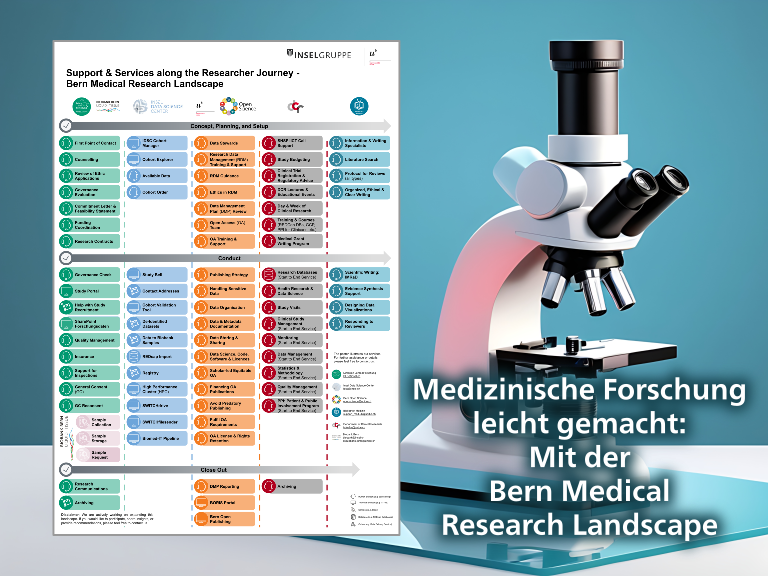
BibMED, Open Science, DCR, Biobank Bern and the Insel Data Center offer a wide range of services for medical research. The Bern Medical Research Landscape shows you where you can find what you need.
Bern Medical Research Landscape (PDF, 1.6 MB)Online Services 24/7

Here for you whenever you want
Take advantage of our online services wherever you are.
Our services at a glance
Systematic Searching Guide
Everything you need to know

Systematic Searching Guide
The Systematic Searching Guide answers your questions about systematic searching in medical databases and registries:
www.unibe.ch/ub/systematicsearchingE-Learning: PubMed Video Tutorials
Made for you

PubMed Video Tutorials
Our video tutorials offer support in conducting systematic searches in PubMed and in designing search strategies.
Glossary for Systematic Literature Searching
Systematic Searching A-Z

Glossary for systematic literature searching (German)
Confused about terminology? Dr. Marc von Gernler’s alphabetized glossary explains the most common terms in systematic searching. The glossary is in German, but we are working on an English translation.
Glossar zur systematischen Literatursuche (deutsch, 1.5.2023) (PDF, 3.5 MB)Cochrane Interactive Learning: How to conduct systematic reviews
How to do a systematic review

Cochrane Interactive Learning
The Cochrane Training website provides a range of learning opportunities for individuals interested in learning more about conducting, editing or reading a systematic review. Whether you are a complete beginner or a seasoned reviewer, you will find new opportunities to learn here about Cochrane systematic review methodology and processes. A registration is required in order to access the training modules.
Customized and professional

Advice and Searches on Demand
Are you considering a systematic review or do you want to develop a search strategy for databases? We support you with assistance and advice.
Consulting and Support Services Overview (PDF, 34KB)Discover our consulting and support services
Overview of Services
| Brief consultation |
Consultations & Searches |
Systematic Review Services |
|
|---|---|---|---|
| 10-20 minutes via Zoom |
Consultations on databases & search strategies. Brief contract searches (max. 2 h, no systematic searches) |
Consultations on systematic and other reviews. Conduction of systematic searches. Free access to Covidence |
|
| Students UniBE |
free | free |
- (CHF 120.00/h) |
| Employees Inselspital |
free | free |
free |
| Employees UniBE / PhD's |
free | free (Searches > 2h: CHF 88.00/h) |
CHF 120.00/h |
| Employees Canton Bern |
free | CHF 88.00/h |
CHF 120.00/h |
| External clients |
free | CHF 114.00/h |
CHF 150.00/h |
| Contact | Wed, 11-12.30 & 16-18 h, Zoom link for drop-in (Note: No drop-in from Dec 20,2024 to Jan 12,2025) |
Detailed information on fees and services:
Brief consultation via Zoom
Quick Question?

Speak with an information specialist
Find answers and resources by dropping in virtually. Every Wednesday 11:00 – 12:30 and 16:00 – 18:00. (Note: No Drop-In from Dec 20,2024 to Jan 12,2025)
Consultations and Remittance Searches
Consultations:
- Formulating your research question
- Developing your search strategy
- Translating your search strings from one database to another to obtain the most complete results
- Peer review of your search strategy
- Sources for systematic literature searching (databases, registries, grey literature)
- Tools, handbooks, and guidance in systematic literature searching
- New publication alerts
Please contact us with the following form. We are looking forward to your request.
Systematic Review and Evidence Synthesis Services
The Research Support Services team of the University of Bern Medical Library offers individual research consultations and contract searches for complex literature searches for systematic or scoping Reviews, HTAs or clinical guidelines. Our services cover:
Advice and Consulting on the following:
- Sequential steps of systematic searching and systematic reviews
- Search concepts and strategy development
- Database selection and searching grey literature (non-published literature)
We offer the following paid services:
- Conducting searches in specified databases
- Designing (complex) search strategies
- Revising your search strategy, subject to the approval of the principal investigator
- Peer-reviewing your search strategies
- Delivery of search results in an agreed-upon format
- Documenting the search strategy, databases searched, and our results. Documentation includes the limits we set for the search. The documents we supply are ready to include in the manuscript's appendix and the PRISMA flow chart.
- Writing up the search for the Methods section of your manuscript
Time frame
Contact us when your protocol has been drafted. Search times vary, depending upon the complexity of the search, the number of databases to be searched, and your availability for feedback. Deadlines are mutually approved.
Authorship
When we conduct complex searches for you and document them for the manuscript (e.g., in the Methods and Appendix), we request co-authorship. If our contribution does not meet the ICMJE standards for authorship, we require clients to acknowledge our work as contributors.
Further information:
Registration for Systematic Review Services
If you want to register for our systematic review services, please fill out the following form and return it to us by email.
Open Science
Information on Open Science, Open Acess, and BORIS is provided by the Open Science team.
Get your work published

Scientific Writing
Scientific Writing Courses with Dr. Kali Tal and Dr. Sampoorna Rappaz: Open to all students and postdocs in the health and natural sciences.
See our Scientific Writing courses
Tutors
Dr. Kali Tal: kali.tal@unibe.ch
Dr. Sampoorna Rappaz: sampoorna.rappaz@unibe.ch
Registration & Fees
- Affiliates from University of Bern, Pädagogische Hochschule PHBern, Inselspital Bern: Free
Registration via ILIAS on course page - Academic fee for affiliates from University and hospital: CHF 150 / course (3 hours)*:
Registration via ILIAS on Academic fee for affiliates from University and hospital: course page - External fee: CHF 200 / course (3 hours)*
Registration via registration form (for Swiss participants not affiliated with the University of Bern)
*Discount if more than 3 (= 2%), more than 5 (= 5%) or more than 10 (= 10%) courses are booked per semester at once.
➔ Participants should have English at a C1 level or higher.
Knowledge and Learning

Courses and Workshops
Brief coffee lectures, systematic searching in databases, and much more. We're happy to share our knowledge.
Get the knowledge
The Medical Library of the University of Bern is committed to teaching students and researchers how to improve their research skills and raise the quality of their publications.
Our courses in literature searching and evidence-based medicine include:
- Curricular courses for the faculties of Medicine and Veterinary Science
- Customized courses to meet the needs of your institution, department, or group
For course offers, please contact: support_med.ub@unibe.ch
Next Courses and Workshops
Systematic searching and more
Please find our courses on the courses on the courses site or at the bottom of this page.
Coffee Lectures: Inputs and News in 20 Minutes
Coffee & Sweets

Brain food for your research projects or study
The coffee lectures of medicine and pharmacy provide practical tips in a nutshell concerning your scientific work. The coffee lectures will take place in the spring and in the fall as an online event. No registration is required
New Coffee Lectures
Missed the Coffee Lecture? Watch the recording on Youtube ▶️
Or book your private coffee lecture:
Slides of past coffee lectures:
Slides Coffee Lectures 2024
Slides Coffee Lectures 2023
Slides Coffee Lectures 2022
Slides Coffee Lectures 2021
Slides Coffe Lectures 2020
Customized Courses and Workshops
We hold various lectures in literature searching as part of the regular curriculum of human medicine, dentistry medicine, biomedicine, veterinary medicine, pharmacy and biotechnical engineering.
The medical library also offers courses for the program "Transferable Skills",the Graduate School for Health Sciences (GHS) und the Graduate School for Cellular and Biomedical Sciences (GCB).
For other courses please contact corresponding study coordinators. To get an offer for customized workshops please contact us via support_med.ub@unibe.ch.
Or alternatively have a look at our video tutorials on literature searching.
Lighten scientific life

Tools for Academic Workflows
Useful databases, tools for statistical analysis, data visualization, citation management, and much more.
Show tools
Questions or considerations about tools: tools.ub@unibe.ch.
AI Tools
AI Tools: Position Statement Medical Library
At the Medical Library, we value ethical conduct, research integrity, critical thinking, transparency, high-quality reproducible science, and trustworthy information. Based on these values, our position on the use of Artificial Intelligence (AI) tools in the production of useful scientific knowledge is that researchers must:
- Have a deep understanding of the limitations and biases of the tool(s) that they intend to use.
- Fact-check the data and information provided by the tool(s) before using it for any scientific purpose. Researchers must take full responsibility for the integrity of everything that they produce.
- Be careful about what information they share with the tool(s). Researchers must not share confidential information, including unpublished hypotheses and results, if the AI developer has access to this data.
- Document details of usage: purpose of use, software details, input(s), date and time of use, user details, raw output(s), etc.
- Think carefully about which tool(s) they want to use and why. Researchers must not use AI for AI’s sake. We recommend critically evaluating a few tools using clearly defined criteria that focus on quality, trustworthiness, and AI developer’s ethics, before deciding on which tool(s) to use. Researchers must re-evaluate their choices and outputs regularly because algorithms change.
- Assess the personal limitations and biases that could impede the objective evaluation of the outputs of the tool(s). Researchers should seek advice and training from experienced and knowledgeable users on how to use the tool(s) safely and effectively.
- Ensure that AI usage does not replace the constant improvement of one’s scientific skills, such as critical thinking, information assimilation leading to original thought, effective communication, etc.
- Disclose the use of tool(s) clearly and fully when sharing scientific information, in line with ethical and institutional guidelines.
If you need any support in the use of AI tools for your scientific literature search or scientific writing feel free to contact us: support_med.ub@unibe.ch
ChatGPT
ChatGPT

ChatGPT (GPT-3)
ChatGPT is a voice and text-based chatbot provided by OpenAI. Based on a large language model (LLM), the generative artificial intelligence produces human-like answers to questions about texts or images. The chatbot masters a variety of language-based tasks, such as writing, rewriting and translating texts. Its output needs to be fact-checked by users, and it is not recommended to share sensitive data with the system.
Elicit
Elicit

Elicit offers an efficient way to identify papers, explore existing research, and obtain an overview of a topic and key concepts. It provides feedback on research questions, and can generate structred report summaries. The tool automates phases of the literature review process, such as finding relevant papers, extracting data, and exporting results. The notebook feature allows for tracking and optimising research workflows such as: finding papers, PDF upload, data extraction, and concept mapping across papers. Results can be sorted by most/least cited, relevancy, recency, and filtered by publication dates, journal quality, study types, etc. Narrative summaries are offered with the top 4 (free Elicit Basic) or top 8 (paid Elicit Plus, Elicit Pro) references. Additional features such as "accuracy mode," "Add a step," or "Ask a new question" help improve results. Papers can be extracted using the tool's suggested columns or by user-defined queries of the text. Users can export search results into RIS, BiB, CSV file (Elicit Plus, Elicit Pro). Presently, Elicit may not offer suitable results for all disciplines/fields of study. The semantic search does not recognise advanced search syntax (e.g., wildcards, truncation).
Rayyan
Rayyan

Rayyan.ai Screening Tool
Rayyan helps to screen titles and abstracts faster during a systematic review. The free version removes duplicate titles. Inclusion and exclusion criteria can be defined and it is possible to work with up to 3 anonymised reviewers. The free version also includes AI-based functions, e.g. sorting by the most relevant titles. The paid version can be used on mobile devices. In the paid, premium plan, users can employ AI agents for autonomous screening decisions within a supervised workflow (human in the loop). A disadvantages is that it is difficult to assign subgroups of articles to different reviewers for screening in the free version.
ASReview
ASReview
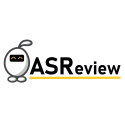
ASReview Screening Tool
ASReview helps you screen titles and abstracts faster. ASReview is an open source, transparent, and educational tool. It learns to identify relevant papers during the screening process. The process starts with an initial selection of relevant papers submitted by the reviewers, which are used by the system to sort articles by relevance. Some knowledge of Python is required to install ASReview. Each user must customize their screening process to suit their needs. ASReview has released a 2.0 version with additional models and features.
ResearchRabbit
ResearchRabbit

ResearchRabbit
ResearchRabbit is a free research tool. It allows you to find publications and visualise their connections in a field of study. ResearchRabbit facilitates forward and backward searches for citations and explores connections between publications that have already been identified. ResearchRabbit's filters and options are limited, and results cannot be filtered by date or type of publication. Forward citation results are not always reliable, i.e. not all publications citing a specific title will necessarily be found.
Consensus
Consensus

Consensus.app helps you find literature and answers to your research questions. Using a customized large language model and vector search, the tool searches the Semantic Scholar corpus for relevant publications and summarizes them. The studies found can be filtered by evidence or study type. For research questions that can be answered with yes/no/maybe, the Consensus Meter shows how many studies agree in their answers. The results can be exported in RIS or CSV format. In addition, Consensus offers a chat feature, through which users can ask questions about key insights, figures, methodology regarding one or several papers. Consensus.app is available at the University of Bern through a trial period for the year 2026. The full version is available when registering with your UniBern email address.
Undermind
Undermind

Undermind.ai is a deep search tool for scientific literature. Its goal is to find the studies most relevant to the research question and to summarize the current state of research. After the initial input of a research question, the tool asks a series of queries to refine the research question. The deep search is performed in the Semantic Scholar corpus and takes several minutes. The results are provided with a relevance percentage. A university email address is required to use the service. Five queries per month are free. Several pricing plans are available.
Scientific Writing Tools
Scientific Writing Tools
AI-based writing tools can be categorised based on what they do, for example, generative AI tools (such as ChatGPT) generate text, paraphraser AI tools (such as Writefull) rewrite text. We have listed these categories below, along with some of the risks of using these tools indiscriminately and without appropriate training. While AI tools can help produce text quickly, this text is generic, ineffectively structured, and, in many instances, factually incorrect. The quality of the output depends more on the user’s experience, knowledge, and training than on the tool’s functionality. Therefore, we cannot recommend any one tool in any of the categories as the best of its class.
We strongly advise academic writers, especially new writers and those with less experience, to use AI tools cautiously and in moderation. Writing well is hard because writing is intertwined with thinking. Both our writing and thinking become clearer as we work on making our sentences more effective and our paragraphs more coherent. We urge all writers to make the effort to read a lot and to write a lot to improve their ability to synthesize evidence, summarize it, and communicate it. We ask them to not fall into the trap of accepting AI-generated texts that simply “sound good.” We insist that they use AI tools only if they are certain of what high-quality scientific writing should look like.
| Category | Example(s) | Risk(s) from indiscriminate usage |
|---|---|---|
|
Translator tools |
DeepL Write |
|
|
Generative tools |
ChatGPT, JenniAI |
|
|
Reader and summarizer tools |
Wordtune, Humata, SciSpace, Leminda |
|
|
Paraphraser tools |
Writefull, Ref-N-Write |
|
|
Academic editing tools |
ProWritingAid, Paperpal |
|
Useful databases in medicine
Further information with the subject librarian: Fachreferat Medizin
Useful databases in pharmacy
Further information you find with the subject librarian pharmacy: Fachreferat Pharmazie.
Ovid MEDLINE ALL Reference database for biomedical and related literature. Published by the National Library of Medicine, USA
Cochrane Training Learning material and online courses for conducting, editing or reading a systematic review (for some courses you need to register with a free Cochrane account and access the website via VPN)
Discover e-journals in your subject area with BrowZine. The best starting point is here: pharmacy journals
Pschyrembel Comprehensive medical encyclopedia, which also comprises the Hunnius Pharmaceutical Dictionary
PubMed Reference database for biomedical and related literature. PubMed includes references from MEDLINE, PubMed Central and the NCBI Bookshelf. Published by the National Library of Medicine, USA
DrugBasePlus Access to various databases for pharmacy and medicine, e.g. ABDA, AHFS-DI, Fiedler, Hager, Index Nominum, Normdosen, Pediatric dosage tables
Analysis, statistics and data management
R
For statistical computing

The R project
R is an excellent open-source software for statistical analyses and graphical representations.
Anaconda
Data Science Platform
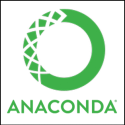
Anaconda
Anaconda package manager for Python and R: Anaconda is a free toolset for data science applications. It enables easy installation and combination of a large selection of Python and R code libraries and effective management of programming environments and software packages.
Writing
SciFlow
SciFlow
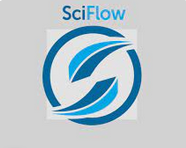
SciFlow makes it easy to write and format scientific texts – whether for a specific journal or as a student paper. SciFlow offers many templates, grammar checking in German and English, an upload function for Word manuscripts and the option of citing with Zotero, Mendeley etc. For groups, SciFlow enables real-time collaboration and the shared use of all references in the text. Finished work can be exported to PDF, LaTeX and Word, among others. The Bern University Library has licensed SciFlow for the entire UniBE campus.
LaTeX
LaTex
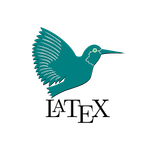
LaTeX is a word processing system that is ideal for creating scientific texts of all kinds. It has particularly useful functions for creating complex documents, and is noteworthy for its stability, flexibility and its high typographic quality. LaTeX is open source, can be used free of charge and is available for all common operating systems.
Turnitin
Turnitin

The University of Bern uses Turnitin to detect plagiarism. The software issues detailed test reports that can be edited interactively. Turnitin can be used by lecturers and university administration staff with their Switch edu-ID via a browser login. Students cannot use Turnitin to scan work.
Citation management
Citing made easy
Citation management programs
These programs enhance easy and correct citing:
Courses for citation management with various programs are offered by the university library
Mendeley
Mendeley

Mendeley is a free reference management software that is available for Windows, Mac and Linux. It is used to organise scientific articles and PDFs and to create citations and bibliographies. Mendeley makes collecting, managing and sharing literature and in-text citations simple and straightforward.
Zotero
Zotero

Zotero is a reference management software that can be used on all common operating systems. Simple to use, it is the ideal software for managing literature, even for smaller papers, and can therefore be used profitably right from the start of your studies. Zotero is free and open source. The University of Bern and the PHBern have set up a Zotero Institutional Plan for Zotero cloud storage. By registering with the institutional e-mail address, unlimited storage is available in the Zotero Cloud.
EndNote
EndNote
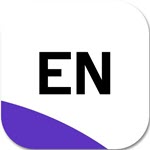
EndNote or EndNote Online supports you in managing references, writing papers and academic publishing: from searching for literature to collecting and organising references, formatting citations and creating a complete bibliography. Members of the University of Bern receive a discount on the product licence via the UniBE software shop.
BibTeX
BibTex
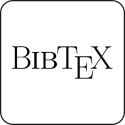
BibTeX is recommended for creating citations and bibliographies in documents created with LaTeX word processing. BibTeX is free and open source and is included in the usual LaTeX standard installations (e.g. MikTex for Windows, MacTex for Mac, TeX Live for Linux). The bibliographic data is managed in a .bib file, which can be created and modified with various reference management softwares. The open source software JabRef is specially tailored to BibTeX files. JabRef is platform-independent and runs on all common operating systems.
Citavi
Citavi
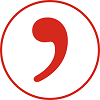
Citavi supports you in writing papers: from researching, collecting and organising references and citations to formatting citations and creating a complete bibliography. Citavi offers helpful functionalities for organising knowledge, especially for humanities scholars and social scientists. Members of the University of Bern and the PH Bern can use Citavi free of charge with a campus licence.
Publishing
Open Science

Open Access
The Open Science Team of UB Bern offers information and support for electronic publishing, research data management and more.
➜ oa.finder: https://finder.open-access.network/
➜ Open policy finder: https://openpolicyfinder.jisc.ac.uk/
➜ Find Open Access journals: https://doaj.org
ORCID
Orcid

ORCID iD is a 16-digit number combination that uniquely identifies researchers and their publications regardless of spelling variants or transcriptions of one’s name. You can register your personal ORCID number free of charge. The personal profile on orcid.org can be used to manage information on publications, training and employment as well as funding. It is possible to choose individual authorisation settings for each item. ORCID is a non-profit initiative supported by universities, academies, funding organisations, scientific publishers and libraries worldwide.
Altmetric Explorer
Altmetric Explorer

Altmetric Explorer is a service that can be used to measure the reception and dissemination of research results on the internet. Unlike traditional bibliometric approaches, it does not measure citations in scientific publications, but rather the dissemination of research on the internet, for example via social media channels such as X or in blogs as well as in non-academic newspapers, Wikipedia, policy documents and many other sources.
Creating and Presenting
BioRender
BioRender

BioRender provides thousands of icons and many templates for professional scientific illustrations, graphs, presentations, and posters. Ideal for visualising cellular processes, experimental setups, laboratory techniques and much more.
Hot off the press

Our publications
We support and collaborate with research teams, devising and improving search strategies for systematic and other reviews.
Show Publications
2025
-
Weidlinger S, Weidlinger M, Schramm RM, Vidal A, Pape J, Karrer T, Rabaglio M, von Wolff M. High impact of chemotherapy on ovarian reserve in breast cancer survivors of reproductive age: A systematic review and meta-analysis. Breast. 2025 Jun 13;82:104514. doi: 10.1016/j.breast.2025.104514. Epub ahead of print. PMID: 40544575.
-
Vidal A, Geiger J, Vinayahalingam V, Pape J, Gulz M, Karrer T, Mueller MD, von Wolff M. High live birth rates after laparoscopic isthmocele repair in infertility: a systematic review and meta-analysis. Front Endocrinol (Lausanne). 2025 Apr 15;16:1507482. doi: 10.3389/fendo.2025.1507482. PMID: 40303644; PMCID: PMC12037975.
-
Pluma A, Hamroun S, Rüegg L, Cecchi I, Kramer M, Perez-Garcia LF, Rivero T, Finckh A, Meissner Y, Förger F. Antirheumatic drugs in reproduction, pregnancy, and lactation: a systematic literature review informing the 2024 update of the EULAR recommendations. Ann Rheum Dis. 2025 Apr 15:S0003-4967(25)00814-3. doi: 10.1016/j.ard.2025.02.021. Epub ahead of print. PMID: 40240264.
-
Vidal A, Trejos V, Pape J, Karrer T, Yilmaz G, von Wolff M. Lower pregnancy rate in women with high uterine peristalsis before embryo transfer: a systematic review and meta-analysis. Reprod Biol Endocrinol. 2025 Mar 29;23(1):49. doi: 10.1186/s12958-025-01380-5. PMID: 40158105.
-
Singer A, Tropschuh K, von Gernler M, Decrinis C, Stute P. The impact of progestogens on RAAS – a systematic review. BMC Women's Health . 2025 Feb 22;25(1):81. doi: 10.1186/s12905-025-03587-5. PMID: 39987087; PMCID: PMC11846257.
-
Vidal A, Bora C, Jarisch A, Pape J, Weidlinger S, Karrer T, von Wolff M. Impact of haematopoietic stem cell transplantation for benign and malignant haematologic and non-haematologic disorders on fertility: a systematic review and meta-analysis. Bone Marrow Transplant. 2025 Feb 26. doi: 10.1038/s41409-025-02520-6. Epub ahead of print. PMID: 40074785.
-
Vidal A, Bora C, von Holzen J, Gulz M, Obmann VC, Pape J, Karrer T, Yilmaz G, von Wolff M. Cine-MRI for Quantifying Uterine Peristalsis: A Systematic Review and Meta-Analysis. J Clin Med. 2025 Feb 6;14(3):1021. doi: 10.3390/jcm14031021. PMID: 39941690; PMCID: PMC11818271.
-
Radojewski P, Piredda GF, Bonanno G, Lövblad KO, Vargas MI, Sutter R, Nanz D, Karrer T, Salanti G, Wiest R. Assessment of the available evidence for the use of 7-Tesla (T) magnetic resonance imaging (MRI) in neurological and musculoskeletal disorders, with comparison to 3-T and 1.5-T MRI: A systematic scoping review. Eur J Neurol. 2025 Jan;32(1):e16557. doi: 10.1111/ene.16557. PMID: 39676509; PMCID: PMC11647057.
-
Schneider C, Koenig C, Žarković M, Stranzinger E, Rivero TM, Rössler J, Kuehni CE, Latzin P, Schindera C, Usemann J. Nitrogen single and multiple breath washout test and lung imaging to detect treatment-related pulmonary toxicity in paediatric cancer patients and survivors: a systematic review. Eur Respir Rev. 2025 Jan 22;34(175):240178. doi: 10.1183/16000617.0178-2024. PMID: 39843160; PMCID: PMC11751724.
-
Pape J, Fernando J, Megaritis D, Weidlinger S, Vidal A, Birkhäuser FD, Karrer T, von Wolff M. Oncological treatments have limited effects on the fertility prognosis in testicular cancer: A systematic review and meta-analysis. Andrology. 2025 May;13(4):731-746. doi: 10.1111/andr.13741. Epub 2024 Aug 27. PMID: 39189883; PMCID: PMC12006886.
2024
-
Anthon C, Vidal A, Recker H, Piccand E, Pape J, Weidlinger S, Kornmann M, Karrer T, von Wolff M. Long-Term Effects on Gonadal Function After Treatment of Colorectal Cancer: A Systematic Review and Meta-Analysis. Cancers (Basel). 2024 Nov 29;16(23):4005. doi: 10.3390/cancers16234005. PMID: 39682193; PMCID: PMC11640400.
-
Janna Pape, Tanya Gudzheva, Beeler Danijela, Susanna Weidlinger, Angela Vidal, Rhoikos Furtwängler, Tanya Karrer, Michael von Wolff, Long-term effects on fertility after central nervous system cancer: a systematic review and meta-analysis, Neuro-Oncology Practice, 2024;, npae078, https://doi.org/10.1093/nop/npae078
-
Weidlinger S, Graber S, Bratschi I, Pape J, Kollár A, Karrer T, von Wolff M. A Systematic Review of the Gonadotoxicity of Osteosarcoma and Ewing's Sarcoma Chemotherapies in Postpubertal Females and Males. J Adolesc Young Adult Oncol. 2024 Aug;13(4):597-606. doi: 10.1089/jayao.2023.0185. Epub 2024 Apr 17. PMID: 38629685.
-
Steinmann M, Rietschin A, Pagano F, Karrer T, Kollár A, Weidlinger S, von Wolff M. Systematic Review of the Gonadotoxicity and Risk of Infertility of Soft Tissue Sarcoma Chemotherapies in Pre- and Postpubertal Females and Males. J Adolesc Young Adult Oncol. 2024 Jul 12. doi: 10.1089/jayao.2024.0057. Epub ahead of print. PMID: 38995852.
-
Vetsch T, Eggmann S, Jardot F, von Gernler M, Engel D, Beilstein CM, Wuethrich PY, Eser P, Wilhelm M. Ventilatory efficiency as a prognostic factor for postoperative complications in patients undergoing elective major surgery: a systematic review.Br J Anaesth. 2024 Apr 20:S0007-0912(24)00144-2. doi: 10.1016/j.bja.2024.03.013. Epub ahead of print. PMID: 38644158.
2023
-
Fuchs A, Koepp G, Huber M, Aebli J, Afshari A, Bonfiglio R, Greif R, Lusardi AC, Romero CS, von Gernler M, Disma N, Riva T. Apnoeic oxygenation during paediatric tracheal intubation: a systematic review and meta-analysis. Br J Anaesth. 2023 Nov 28:S0007-0912(23)00622-0. doi: 10.1016/j.bja.2023.10.039. Epub ahead of print. PMID: 38030551.
-
Zürcher A, Knabben L, von Gernler M, Stute P. Depot medroxyprogesterone acetate and breast cancer: a systematic review. Arch Gynecol Obstet. 2023 Nov 15. doi: 10.1007/s00404-023-07265-5. Epub ahead of print. PMID: 37966517.
-
Bano A, Künzler J, Wehrli F, Kastrati L, Rivero T, Llane A, Valz Gris A, Fraser AG, Stettler C, Hovorka R, Laimer M, Bally L; CORE‐MD investigators. Clinical evidence for high-risk CE-marked medical devices for glucose management: A systematic review and meta-analysis. Diabetes Obes Metab. 2024 Oct;26(10):4753-4766. doi: 10.1111/dom.15849. Epub 2024 Aug 14. PMID: 39143655.
-
Stute P, Walker LJ, Eicher A, Pavicic E, Kolokythas A, Theis S, von Gernler M, von Wolff M, Vollrath S. Progestogens for endometrial protection in combined menopausal hormone therapy: A systematic review. Best Pract Res Clin Endocrinol Metab. 2023 Aug 22:101815. doi: 10.1016/j.beem.2023.101815. Epub ahead of print. PMID: 37634998.
-
Stojic S, Minder B, Boehl G, Rivero T, Zwahlen M, Gemperli A, Glisic M. Systematic review and meta-analysis use in the field of spinal cord injury research: A bibliometric analysis. J Spinal Cord Med. 2025 Jan;48(1):54-64. doi: 10.1080/10790268.2023.2251205. Epub 2023 Sep 8. PMID: 37682290; PMCID: PMC11748868.
-
Michailidou, E.; Rüegg, P.O.; Karrer, T.; Korda, A.; Weder, S.; Kompis, M.; Caversaccio, M.; Mantokoudis, G. Hearing Results after Transmastoid Superior Semicircular Canal Plugging for Superior Semicircular Canal Dehiscence: A Meta-Analysis. Audiol. Res. 2023, 13, 730-740. https://doi.org/10.3390/audiolres13050065
-
Krone LB, Fehér KD, Rivero T, Omlin X. Brain stimulation techniques as novel treatment options for insomnia: A systematic review. Journal of sleep research. 2023 May 18:e13927. https://doi.org/10.1111/jsr.13927
-
Bano A, Laimer M, Wehrli F, Kunzler J, Rivero T, Fraser AG, Stettler C, Hovorka R, Bally L. Clinical evidence for high-risk medical devices used to manage diabetes: protocol for a systematic review and meta-analysis. BMJ Open. 2023 Apr 11;13(4):e070672. doi: 10.1136/bmjopen-2022-070672. PMID: 37041065; PMCID: PMC10106051.
-
Weidlinger S, Winterberger K, Pape J, Weidlinger M, Janka H, von Wolff M, Stute P. Impact of estrogens on resting energy expenditure: A systematic review. Obes Rev. 2023 Aug 6:e13605. doi: 10.1111/obr.13605.
-
Theis, S; Baumgartner, S J; Janka, H; Kolokythas, A; Skala, C; Stute, P (2023). Quality of life in menopausal women in the workplace - a systematic review. (In Press). Climacteric, pp. 1-8. Taylor & Francis 10.1080/13697137.2022.2158729
2022
-
Jeyaprakash N, Maeder S, Janka H, Stute P. A systematic review of the impact of 7-keto-DHEA on body weight. Arch Gynecol Obstet. 2022 Dec 25. doi: 10.1007/s00404-022-06884-8. Epub ahead of print. PMID: 36566478.
-
Borissov N, Haas Q, Minder B, Kopp-Heim D, von Gernler M, Janka H, Teodoro D, Amini P. Reducing systematic review burden using Deduklick: a novel, automated, reliable, and explainable deduplication algorithm to foster medical research. Syst Rev. 2022 Aug 17;11(1):172. doi: 10.1186/s13643-022-02045-9.
-
L. M. Kaemmle, A. Stadler, H. Janka, M. von Wolff & P. Stute (2022) The impact of micronized progesterone on cardiovascular events – a systematic review. Climacteric, DOI: 10.1080/13697137.2021.2022644, PMID: 35112635.
-
Mevissen M, Ward JM, Kopp-Schneider A, McNamee JP, Wood AW, Rivero TM, Thayer K, Straif K. Effects of radiofrequency electromagnetic fields (RF EMF) on cancer in laboratory animal studies. Environ Int. 2022 Mar;161:107106. doi: 10.1016/j.envint.2022.107106. Epub 2022 Jan 29. PMID: 35091376.
2021
- Weidlinger S, Schmutz C, Janka H, Gruetter C, Stute P. Sustainability of vaginal estrogens for genitourinary syndrome of menopause - a systematic review. Climacteric. 2021;3(1-9); doi: 10.1080/13697137.2021.1891218.
- Stute P, Wienges J, Koller A-S, Giese C, Wesemüller W, Janka H, Baumgartner S. Cognitive health after menopause: Does menopausal hormone therapy affect it? Best Pract Res Clin Endocrinol Metab. 2021; doi: 10.1016/j.beem.2021.101565
- Nucera M, Meuli L, Janka H, Schindewolf M, Schmidli J, Makaloski V. Comprehensive review with pooled analysis on external and internal jugular vein aneurysm. J Vasc Surg Venous Lymphat Disord. 2021 Oct 9:S2213-333X(21)00502-3. doi: 10.1016/j.jvsv.2021.09.009. Epub ahead of print. PMID: 34634519.
- Leitlinienreport der interdisziplinären evidenz- und konsensbasierten S3-Leitlinie für Diagnostik und Therapie von Zwangsstörungen im Kindes- und Jugendalter; AWMF Register Nr. 028-007 https://www.awmf.org/leitlinien/detail/ll/028-007.html
2020
- Fernandez-Palomo C, Fazzari J, Trappetti V, Smyth L, Janka H, Laissue J and Djonov V. Animal Models in Microbeam Radiation Therapy: A Scoping Review. Cancers. 2020;12(3). 527; doi:10.3390/cancers12030527.
- Schaffer MF. Transforming the medical library into a welcoming learning space: a collaborative project. Journal of EAHIL. 2020;16(2):39 - 42. doi: 10.32384/jeahil16393.
- Schaffer MF. Dienstleistungsangebot für EBM – von der Lehre bis zur klinischen Forschung und Praxis: Erfahrungen an der Universität Bern. GMS Med Bibl Inf. 2020;20(1-2).
Contacts

Team
Please contact us with your requests. We look forward to helping you.
Team members
Head

- Name / Titel
- Dr. Michelle Schaffer
- Funktion
- Head of the medical and natural sciences library department, coordinator for product and transformative management
- michelle.schaffer@unibe.ch
- Phone
- +41 31 684 49 47
- Phone2
- +41 31 684 46 07
Subject librarian medicine

- Name / Titel
- Michal Pavel
- Funktion
- Head of collection management, subject librarian medicine and pharmacy
- michal.pavel@unibe.ch
- Phone
- +41 31 684 53 99
- Phone2
- +41 31 684 46 07
Research support medicine and pharmacy

- Name / Titel
- Tania Rivero
- Funktion
- Information specialist medicine, systematic review services, (systematic) literature searches, individual research consultation and courses
- tania.rivero@unibe.ch
- Phone
- +41 31 684 49 07

- Name / Titel
- Dr. Zayne Roa Dìaz
- Funktion
- Information specialist medicine
- zayne.roadiaz@unibe.ch
- Phone
- +41 31 684 94 86

- Name / Titel
- Tanya Karrer
- Funktion
- Information specialist medicine, systematic seview services, (systematic) literature searches, individual research consultation and courses
- tanya.karrer@unibe.ch
- Phone
- +41 31 684 94 87

- Name / Titel
- Dr. Marc von Gernler
- Funktion
- Information specialist pharmacy, systematic review services, (systematic) literature searches, individual research consultation and courses
- marc.vongernler@unibe.ch
- Phone
- +41 31 684 94 91

- Name / Titel
- Dr. Kali Tal
- Funktion
- Lecturer academic writing
- kali.tal@unibe.ch
- Phone
- +41 33 533 32 36

- Name / Titel
- Dr. Sampoorna Rappaz
- Funktion
- Lecturer Academic Writing
- sampoorna.rappaz@unibe.ch
- Phone
- +41 31 684 94 89

